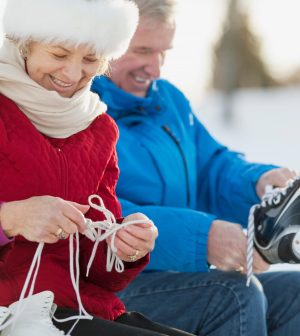- The Long-Term Effects of Daily Turmeric Supplements on Liver Health
- Could Your Grocery Store Meat Be Causing Recurring UTIs?
- Are You Making This Expensive Thermostat Error This Winter?
- Recognizing the Signs of Hypothyroidism
- 10 Strategies to Overcome Insomnia
- Could Artificial Sweeteners Be Aging the Brain Faster?
- Techniques for Soothing Your Nervous System
- Does the Water in Your House Smell Funny? Here’s Why
- Can a Daily Dose of Apple Cider Vinegar Actually Aid Weight Loss?
- 6 Health Beverages That Can Actually Spike Your Blood Sugar
Seniors, Make This Winter an Active & Healthy One

Winter may feel like a time for hibernation, but it’s important for seniors to safely keep up their hobbies and physical activity in the cold weather.
“It’s important to get outside as much as possible, whether it’s temperate or even if it’s colder, as long as it’s safe to do so,” said Dr. Angela Catic, an associate professor in the Center on Aging at Baylor College of Medicine, in Houston.
“If it’s cold, bundling up and getting outside is good for your spirit and good for you physically,” she said in a Baylor news release.
Continue walking, biking or being in nature, Catic suggested, while being cautious of snow or icy conditions. But don’t pick up a new active sport like skiing or snowboarding, unless that was already a hobby, she cautioned.
Here are some of her tips:
If you typically garden outside, grow some indoor plants in the winter. Plan for the upcoming growing season by perusing gardening catalogs and making a springtime plan.
Explore indoor activities, such as reading, doing puzzles, playing games, crafting or knitting. Go to concerts, visit museums and take road trips.
If the thought of picking up a new hobby post-retirement seems daunting, reflect on activities you enjoyed in the past before you were focused on work.
Check out adult education programs in your area. They may offer a variety of new pastimes, including woodworking, sewing or birdwatching. Books at the public library showcase skills you can learn, such as gourmet cooking or quilting.
Consider volunteer work. This can be a rewarding way to spend time.
“We want to keep ourselves active, both physically and mentally, and hobbies often do that. They bring joy and fun to our lives, and that is so important in terms of preserving cognitive function and mental health,” Catic said. “We encourage people to be engaged and do things they enjoy that connect them to their community.”
More information
The U.S. Centers for Disease Control and Prevention has more on physical activity for older adults.
SOURCE: Baylor College of Medicine, news release, Jan. 10, 2023
Source: HealthDay
Copyright © 2026 HealthDay. All rights reserved.










